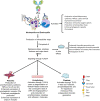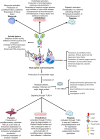The Pathophysiology of The Antiphospholipid Syndrome: A Perspective From The Blood Coagulation System
- PMID: 35317658
- PMCID: PMC8950029
- DOI: 10.1177/10760296221088576
The Pathophysiology of The Antiphospholipid Syndrome: A Perspective From The Blood Coagulation System
Abstract
The antiphospholipid syndrome (APS), a systemic autoimmune disease characterized by a hypercoagulability associated to vascular thrombosis and/or obstetric morbidity, is caused by the presence of antiphospholipid antibodies such as lupus anticoagulant, anti-β-2-glycoprotein 1, and/or anticardiolipin antibodies. In the obstetrical APS, antiphospholipid antibodies induce the production of proinflammatory cytokines and tissue factor by placental tissues and recruited neutrophils. Moreover, antiphospholipid antibodies activate the complement system which, in turn, induces a positive feedback leading to recruitment of neutrophils as well as activation of the placenta. Activation of these cells triggers myometrial contractions and cervical ripening provoking the induction of labor. In thrombotic and obstetrical APS, antiphospholipid antibodies activate endothelial cells, platelets, and neutrophils and they may alter the multimeric pattern and concentration of von Willebrand factor, increase the concentration of thrombospondin 1, reduce the inactivation of factor XI by antithrombin, increase the activation of factor XII, and reduce the activity of tissue plasminogen activator with the subsequent production of plasmin. All these effects result in less permeable clots, denser, thinner, and with more branched fibrin fibers which are more difficult to lysate. As a consequence, thrombosis, the defining clinical criterion of APS, complicates the clinical course of the patient.
Keywords: antiphospholipid syndrome; autoantibodies; autoimmunity; miscarriage; thrombosis.
Conflict of interest statement
Figures




Similar articles
-
The role of thrombospondin-1 in the pathogenesis of antiphospholipid syndrome.J Autoimmun. 2020 Dec;115:102527. doi: 10.1016/j.jaut.2020.102527. Epub 2020 Jul 21. J Autoimmun. 2020. PMID: 32709480
-
Is There an Additional Value in Detecting Anticardiolipin and Anti-β2 glycoprotein I IgA Antibodies in the Antiphospholipid Syndrome?Thromb Haemost. 2020 Nov;120(11):1557-1568. doi: 10.1055/s-0040-1714653. Epub 2020 Jul 21. Thromb Haemost. 2020. PMID: 32696448
-
Antiphospholipid and antioangiogenic activity in females with recurrent miscarriage and antiphospholipid syndrome.Ann Clin Biochem. 2017 Sep;54(5):577-583. doi: 10.1177/0004563216672248. Epub 2016 Sep 16. Ann Clin Biochem. 2017. PMID: 27638930
-
Mechanisms of immunothrombosis and vasculopathy in antiphospholipid syndrome.Semin Immunopathol. 2022 May;44(3):347-362. doi: 10.1007/s00281-022-00916-w. Epub 2022 Feb 4. Semin Immunopathol. 2022. PMID: 35122116 Free PMC article. Review.
-
Pathophysiology of thrombosis and pregnancy morbidity in the antiphospholipid syndrome.Eur J Clin Invest. 2012 Oct;42(10):1126-35. doi: 10.1111/j.1365-2362.2012.02697.x. Epub 2012 Jul 12. Eur J Clin Invest. 2012. PMID: 22784367 Review.
Cited by
-
Immune dysregulation is an important factor in the underlying complications in Influenza infection. ApoH, IL-8 and IL-15 as markers of prognosis.Front Immunol. 2024 Jul 26;15:1443096. doi: 10.3389/fimmu.2024.1443096. eCollection 2024. Front Immunol. 2024. PMID: 39176097 Free PMC article.
-
Criteria and Non-Criteria Antiphospholipid Antibodies in Antiphospholipid Syndrome: How Strong Are They Correlated?Biomedicines. 2023 Aug 3;11(8):2192. doi: 10.3390/biomedicines11082192. Biomedicines. 2023. PMID: 37626689 Free PMC article.
-
Criteria and Non-Criteria Antiphospholipid Antibodies and Cancer in Patients with Involuntary Weight Loss.J Pers Med. 2023 Oct 29;13(11):1549. doi: 10.3390/jpm13111549. J Pers Med. 2023. PMID: 38003864 Free PMC article.
-
Investigating the predictive role of serum amyloid A and its association with immunological and coagulation biomarkers in recurrent pregnancy loss.Libyan J Med. 2025 Dec;20(1):2472492. doi: 10.1080/19932820.2025.2472492. Epub 2025 Mar 1. Libyan J Med. 2025. PMID: 40022649 Free PMC article.
-
Circulating immune-complexes of IgG/IgM bound to B2-glycoprotein-I associated with complement consumption and thrombocytopenia in antiphospholipid syndrome.Front Immunol. 2022 Sep 12;13:957201. doi: 10.3389/fimmu.2022.957201. eCollection 2022. Front Immunol. 2022. PMID: 36172349 Free PMC article.
References
-
- Levy RA, Gómez-Puerta JA, Cervera R. History, classification, and subsets of the antiphospholipid syndrome. In: Cervera R, Espinosa G, Khamashta M, eds. Antiphospholipid Syndrome in Systemic Autoimmune Diseases. 2nd ed. Elsevier; 2017:1‐16.
Publication types
MeSH terms
Substances
LinkOut - more resources
Full Text Sources
Research Materials
Miscellaneous

